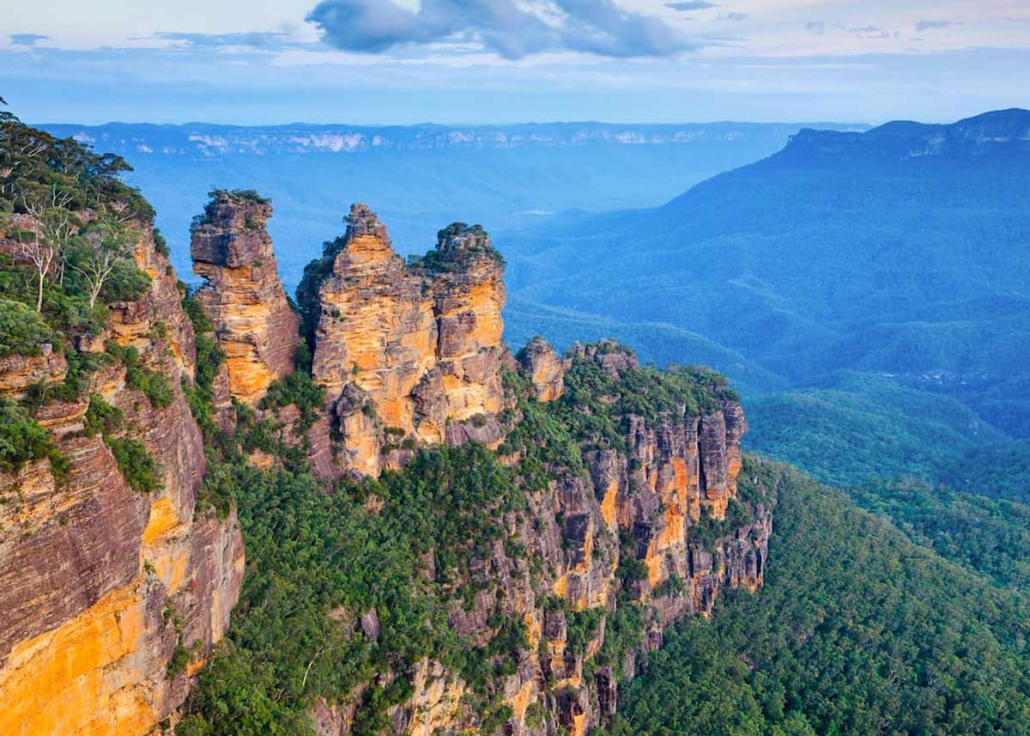The Blue Mountains, NSW.
Photo: www.nationalparks.nsw.gov.au
‘More than conquerors’
Dr Miriam Pepper
Ordinary Sunday 26, Year B
Mountain Sunday, Season of Creation
Mark 16:14-18; Romans 8:35-39; Psalm 48:1-11
In the longer ending of the gospel of St Mark, Jesus commissions his disciples to proclaim the gospel, the good news, to all creation. To interpret this in the context of Mark means to understand proclamation as working for healing, wholeness and freedom for all – especially those who are excluded and made invisible.
I feel wary of this calling. Clive said to us on Planet Earth Sunday, it matters where we are if we wish to observe the Season of Creation. I name my location. To attempt to proclaim the good news to all creation, from position as a beneficiary of the historical and present conquest of earth and her resources, is deeply fraught. The language of conquering (Romans 8), ruling (Psalm 48), carries danger, even when reinterpreted in seemingly more benign directions. Proclamation from a place of privilege risks empty words, silencing the suffering of others, and the continuation of abuse of other humans and other kind.
Technological mastery is not sufficient. It is with dismay that I read about the ecological implications of a rare earth metals boom required for the renewable energy revolution, with horror that the global supply chain for solar panels is rife with the forced labour of Uyghurs and Kazakhs in Xingjiang. It is so important that the struggle for climate justice holds front and centre those who are on the frontlines of resource extraction and climate change and who suffer from its touted solutions. Others of us work alongside, in solidarity. And if healing and wholeness are to become possible for all on this limited planet, those of us with more than enough face relinquishing privileges and comforts to which we have been accustomed. We would need 4.5 planets if all of humanity consumed like Australia’s population does.
Perhaps some of our experiences of life in a pandemic – the restrictions that we have undergone that together we might safeguard human health – place us in a better position to accept ecological limits? Beyond deprivation, to be transformed by them?
Mountains have not featured in my day-to-day living. I have lived almost my entire life on flat, coastal land. And yet, through a series of experiences in my early adulthood – tourist experiences that I undertook often with little appreciation of the cultures and ecosystems that I was visiting and without comprehending the environmental impacts of long-distance travel – walking hills, passes and mountains has been key to my grasp of limits.
I was not yet 20 when I first experienced persistent knee pain when walking in the Indian Himalayas, pain that worsened as time passed. A particularly memorable experience, 10 years on, I scrambled, disoriented, at a modest height of 800 metres above sea level in the fog on the Old Man of Coniston fell in the English Lake District. My knee swelled up like a balloon by the next morning. So much for conquering the mountain.
Coming to terms with my own body, a long time before old age, has meant to learn to honour my weaknesses and vulnerabilities. In turn I come to recognise the vulnerability of others, including mountain creatures and ecosystems. Already under threat from habitat destruction and degradation, how can they adapt to rapidly rising temperatures? How can they migrate if there is nowhere colder for them to go?
Can I, can we, make space for them – the montane bogs, fens, heaths, woodlands and forests and their inhabitants – and for the others on the frontlines of this crisis? Do I, do we, know the love of God in Christ that is always near to us – in hardship, in distress, in discomfort, in bearing witness to the disappearing creatures, in the long hard work of advocacy? Amen.




